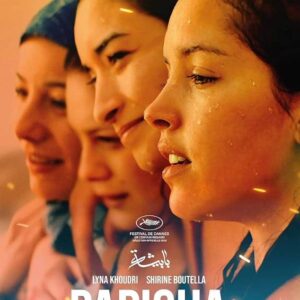In some ways, Papicha tells a familiar story of girlhood in the 1990s — sneaking out, bonding with university roommates, and falling in love. Yet the film’s protagonist, 18 year-old Nedjma (Lyna Khoudri), is coming of age in extraordinary circumstances — Algeria’s Black Decade, a civil war fought between the Islamist rebels and the government which killed 200,000 and hit women particularly hard.
The film, directed by Mounia Meddour, follows Nedjma’s struggle to preserve her freedom in a restrictive and violent Algeria. Nedjma watches Islamic extremism encroach on everyday life. Her university classes are disrupted by women in black hijabs who protest the professor’s use of French instead of Arabic. Overnight, the campus is covered with posters that warn female students to conform to strict rules of dress. An extremist even approaches Nedjma on the bus, ordering her to “cover yourself up before a funeral shroud does.”
In the face of shrinking freedoms for women, Nedjma dreams of becoming a designer, mesmerized by the contours and folds of fabric. She takes inspiration from an outer-garment worn by Algerian women — the haik — and proposes a fashion show with dresses made entirely out of the traditional white cloth. As she and her friends work to put on the show, they encounter backlash, ridicule, and threats. The film often lulls viewers with youthful idealism and teenage fun, but Meddour is unafraid of violently bursting the illusion at key moments.* This gives Papicha a deep emotional resonance.
Nedjma is a spirited heroine — sometimes stereotypically so. She has certainly earned her nickname of “papicha” (meaning “cool girl”). The most outspoken of her friends, Nedjma constantly pushes back against cultural conservatism. Her brazenness is balanced by friends like Samira (Amira Hilda Douaouda), who is more pious although she shares Nedjma’s desire for liberation. The characters also have different relationships to Algeria. Some of the students are desperate to escape, seeing the country as “just a big waiting room”; meanwhile, Nedjma wants to remain and help rebuild a new Algeria.
Although the film’s female characters are powerful, other elements are less fleshed out. For example, the film suffers from poorly developed male characters. Furthermore, it is light on context about the causes and factions of the civil war. Papicha focuses more heavily on Islamist terrorism than the role of the Algerian military. Students may need to consult outside sources to understand how Islamist forces initially rose to power in Algeria during relatively liberal elections which were then canceled by the government, resulting in guerilla war.
Despite some weaknesses, the film is a poignant introduction to the plight of Algerians. Although it deals with several tragedies, Papicha manages to offer hope and even lightheartedness.
Discussion Questions
- How does fashion — particularly Nedjma’s process of choosing, dying, and sewing cloth — function as a symbol? How can fabric be both constricting and liberating?
- What does the film say about Algerian identity? How do others question Nedjma’s authenticity as an Algerian?
- The film celebrates Nedjma’s idealistic principles, but her dedication also unintentionally hurts her friends and family. What do you think the film is saying about Nedjma’s resistance? Is there a way to balance activism and pragmatism?
*Note: the film briefly depicts an attempted sexual assault.


